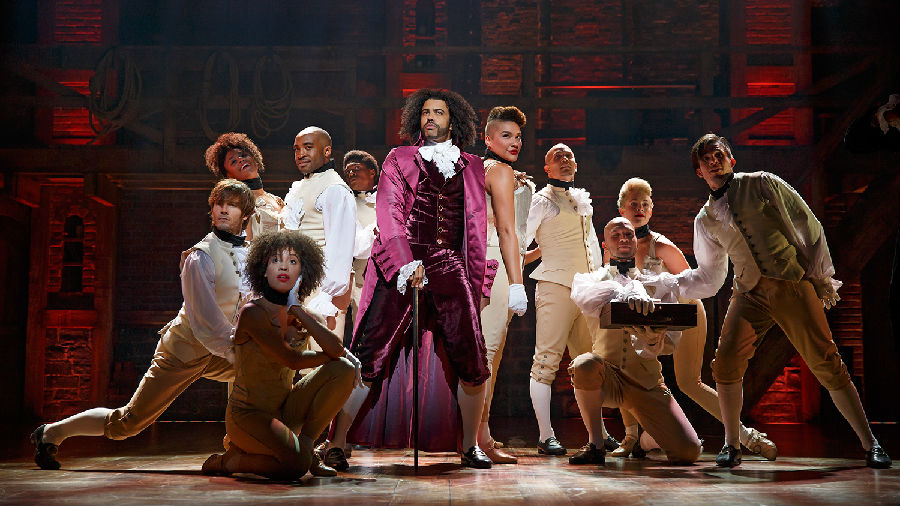(单词翻译:单击)
听力文本
Now, the VOA Learning English program Words and Their Stories.
On this show, we talk about expressions in American English and often explore their meanings in depth.
And today, we visit the exciting world of live theater!
Give my regards to Broadway. Remember me to Harold Square. Tell all the folks on 42nd Street that I will soon be there!
The world of Broadway and live theater have given us many expressions. And several come from part of the stage -- the place where plays, musicals and other stage shows are performed.
For example, in a theater, the wings are the hidden areas to the left and right of the stage. This is where actors wait before they make an appearance. So, an actor waiting in the wings is standing off-stage, waiting to perform.
But the expression "waiting in the wings" is not just used in the world of theater. It can also mean someone is ready to enter a situation, be brought to public attention or take a job or position.

For example, you can use it in a business setting.
Let's say the head of a company is nearing the end of her career. She has been training her assistant to take her place when she retires. So, you could say her assistant is waiting in the wings to take control of the business.
Now, let's go back to the stage. People other than actors can stand in the wings of a theater.
Often actors on stage forget their lines. So, it is a good idea to have someone else standing in the wings holding a script. He or she could say the forgotten lines to the actor without the audience hearing or seeing them.
Actors who forget many of their lines may not have prepared very well. And that is where we get the expression to wing it. When you "wing it," you do something or try to do something without much preparation.
There are other expressions that mean about the same as "winging it." If I say something off the cuff or off the top of my head, I say it without thinking.
Now, no expression in the theater world is more iconic than: "The show must go on."
It's clear that every one of you is in perfect physical condition,
So, the show must go on!
Why?
Because as old as time itself, there's a grand theatrical tradition that the show must go on!
This saying means that no matter what happens – even if all the performers' costumes get lost at the cleaners or the lead actor gets food poisoning – the show will be performed.
This represents the heart of theater people. They will do whatever it takes to put the show on. It also means that no one is more important than the show. If something should happen to an actor, someone must be ready and able to take their place. That is why actors in live theater performances have standbys. Also called understudies, these people do not perform every day, but they are ready to step into one or more parts should they be needed.
So there are actors who are on standby, waiting in the wings for their turn. But we can all find ourselves on standby. A standby is anyone who is ready to step in when needed, especially in an emergency. For example, if a hospital is expecting to treat many wounded people, they may have many doctors, nurses and ambulances on standby.
Besides emergencies, we also commonly use this word in airline travel. A person on standby is on a waiting list. They wait for an available unreserved seat on the airplane. Used as an adjective, there are standby passengers and standby tickets.
"Standby" as a verb means to be waiting but ready to act. But keep in mind, that this sounds very official. We probably would not tell our family and friends to "stand by," unless it was an emergency or as part of an important event.
We should mention another important way we use "stand by." When we stand by people we give them the support they need to get through a difficult time. It is important to stand by your families and friends.
And that's Word and Their Stories. I'm Anna Matteo.
重点解析
1.Remember me to 代我向……问好;问好
Remember me to your father in your letter.
你在信上给我带一笔,问你父亲好。
2.other than 不同于;除…之外;而不是
You could ask someone else other than me to go with you.
你可以找(除了我以外的)另外一个人陪你去。
3.off the cuff 马上;即兴地;非正式地
Faced with all this my writing today is brief and off-the-cuff.
面对这些情况,今天我就先随便写点什么。
4.lead actor 男主角;最佳男主角;主演
In his next film, Old Well, he worked as a cameraman and a lead actor.
他的接下来的一部电影《老井》中,张艺谋担任摄影师和主演。
参考译文
现在是VOA学英语《词汇掌故》节目时间。
节目中,我们谈论美式英语里的表达,往往还深度探讨它们的意义。
今天我们将拜访令人兴奋的现场戏剧表演的世界!
致敬百老汇。代我向葛尔·哈罗德问好。告诉42街的所有人我很快就到了!
百老汇的世界和现场戏剧演出给我们提供了很多的表达。其中几个表达出自舞台部分:那是舞台演出、音乐剧和其他舞台演出表演的地方。
例如,在剧院中,侧厅(wings)指的是舞台左右两边的隐藏区域。这是演员在演出前的等候区。因此,演员在侧厅等待(waiting in the wings)就是指演员站在台下,等待表演。
但是表达“waiting in the wings(蓄势待发)”并不仅仅适用于戏剧界。它也能表示某人准备好进入某种情境中的意思,被公众注意或者接受一份工作或一个职位。
例如,你可以在商业背景下使用这个表达。
假设一家公司的负责人即将结束她的职业生涯。她一直在培训自己的助手以在她退休后接任她的职位。那么,你可以说她的助手正等着掌管公司。
现在,让我们继续舞台的话题。演员以外的人也可以站在剧院的等候区。
台上的演员经常会忘了他们的台词。因此,有人拿着剧本站在侧厅是个不错的主意。他或者她可以对演员说出演员忘了的台词而不被观众听见或者看见。
忘了很多台词的演员也许准备并不充分。那就是表达“wing it(即兴表演)”的出处。当你即兴表演的时候,你没有做太多的准备就去做某件事情或者尝试着做某件事情。
还有其他和“winging it(即兴表演)”有着相同意思的表达。如果我即兴说了什么或者我不假思索(off the top of my head)地说了什么,那表示我没有经过思考就说了什么。
在戏剧界,没有表达比“The show must go on(演出必须继续)”这个表达更经典的了。
很显然,你们每个人的身体状态都很好,
因此,表演必须继续下去!
为什么?
因为有一个伟大的戏剧传统,它和时间一样悠久,那就是“the show must go on(演出必须继续)!”
这个说法的意思是无论发生了什么,即使是所有表演者的服装都在洗衣房里弄丢了或者主角食物中毒了,演出也将进行下去。
这代表着戏剧人的心声。他们会不惜一切代价让表演进行下去。这也意味着没人比演出更重要。如果一个演员意外发生了什么,必须有人准备好替换那个人。这就是现场戏剧表演的演员会有后备人选(standbys)的原因。后备人选也被称为替补演员,这些人不是每天都表演,但是万一需要他们的时候,他们也准备好了去参与一个或者多个部分。
因此,有替补演员处于待命状态(on standby),时刻准备着轮到他们。但是我们都能发现我们自己处于待命状态。一旦需要,待命人员就会行动,特别是紧急的时候。例如,如果一家医院要治疗许多的伤员,他们也许会有很多的后备医生、护士以及救护车。
除了紧急情况,我们也常在航空旅行时用到这个单词。待命人员在候补名单上。他们在等待飞机上的空位。“standby”作为形容词使用时,有等退票的旅客和剩余票。
“standby”作为动词,意思是待命。但是记住,这听起来很正式。我们可能不会让自己的家人和朋友“待命”,除非是紧急情况或者是作为一个重要活动的一部分。
我们应该提及“stand by”的另一个很重要的用法。当我们“stand by(支持)”某人,我们给予他们需要度过困难阶段的支持。支持自己的家人和朋友是很重要的事情。
这就是本期的《词汇掌故》。我是安娜·马特奥。


